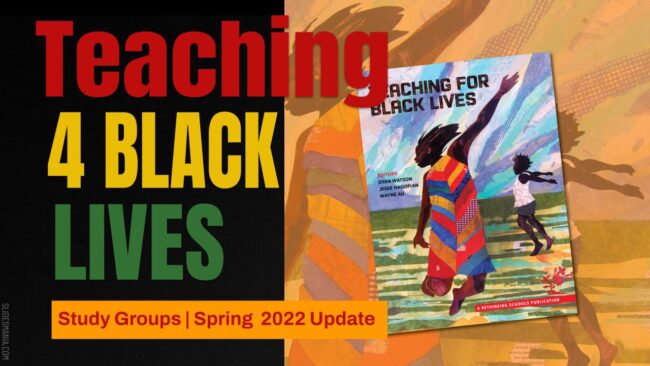
Below you will find selected updates and snapshots from Teaching for Black Lives study group coordinators. It is impressive to read about the range of activities and interests — and the common threads.
Also, make sure you have registered for the upcoming curriculum workshops and online classes with people’s historians.
Study Groups at Work
These are excerpts from many of the updates we received to provide glimpses of your activities from around the country. We can add more of your stories and photos — so keep them coming.
Arizona
Mesa: This was the hardest year for teachers to do almost anything extra. So, a couple of us met and we decided to get as many of our club members involved in justice and equity work as possible and to send people to conferences through our association. Here is what we prepared for Black Lives Matter at School Week of Action.
California
Hayward: A theme connecting us has been building community as a group and focusing on Black students’ identity. We voted to select which section of the book to focus on. The group chose to do a deep dive into section 1.
Joshua Tree: We have been discussing the book in the context of the recent controversy around critical race theory in education, book bans, etc. We have discussed how it’s important for anti-racist teachers and social justice teachers to have allies; and we think of our study group as an opportunity to build connections and make allies.
Los Angeles: We have been working on a Nearpod PD presentation on anti-racist teaching for other teachers in our district.
Salinas:
Concluded our last book study meeting of the year on such an historic day #KBJConfirmed !!! Such a great experience to dive deep into dialogue & action #T4BL planning w/ colleagues. Thanks to @ZinnEdProject @RethinkSchools for supporting this work. Looking forward to continuing!! pic.twitter.com/5X05Zt6zCz
— Mark Gomez (@gomehead2000) April 8, 2022
San Lorenzo Valley: We had a lot of discussions about why certain topics were not taught when we were younger, as well as why they are still not a part of so many formal curriculums today. We talked a lot about how we can infuse these topics into our our classrooms. Some of the study group members traveled to the Museum of Tolerance in a school district sponsored trip and got their first non-Zoom squares group photo below.
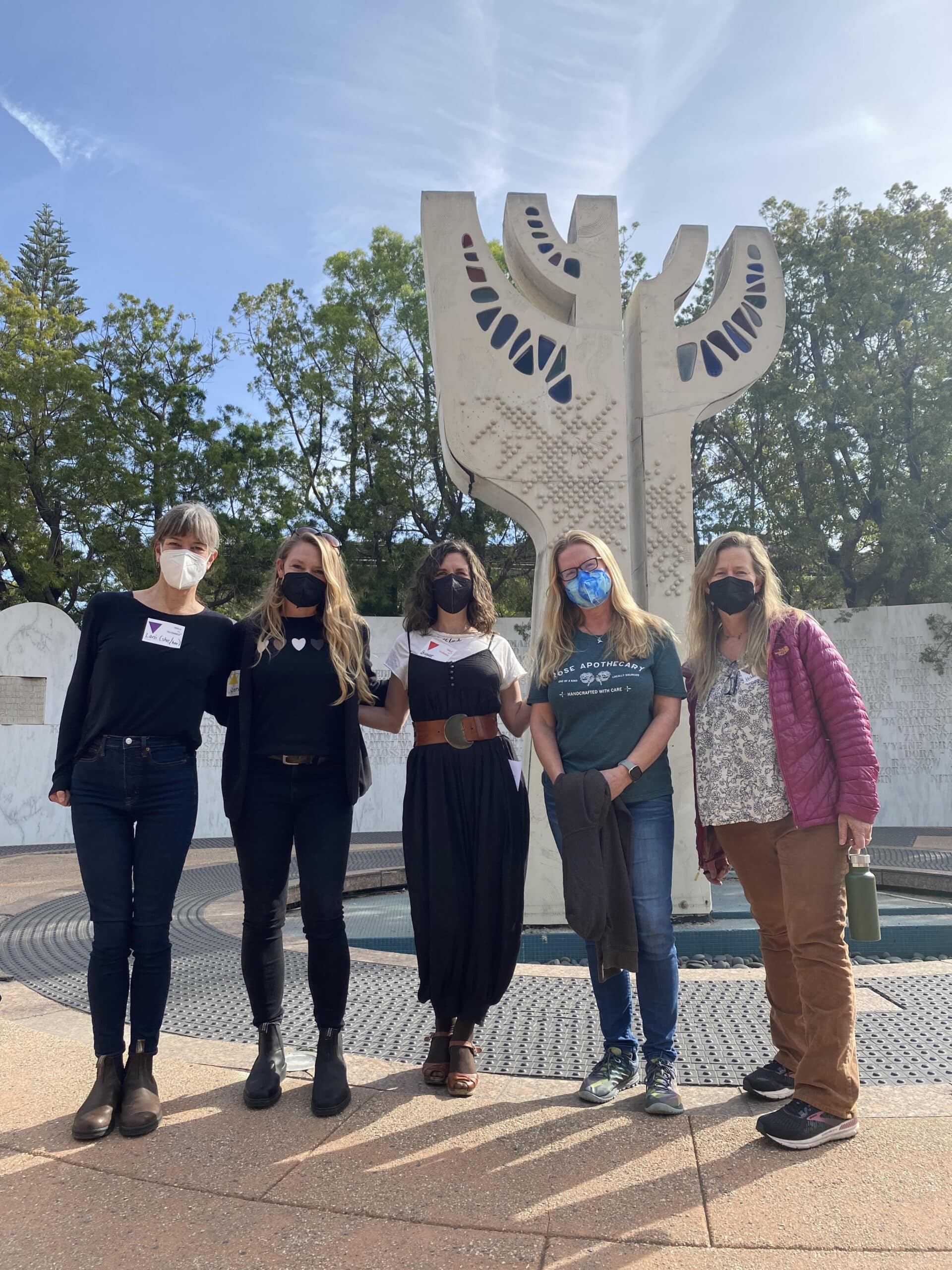
San Lorenzo Valley Study Group
Connecticut
Hamden: We’re not only getting to talk to people in the agency we’ve never met, but we have a great mix of positions, as well, including teachers, teacher assistants, behavior techs, and guidance counselors. Each session we’re using a different discussion protocol so we can bring the strategies back to our classrooms and not just our learning. Note: In the photo below, some group members are missing due to an outbreak of strep throat!
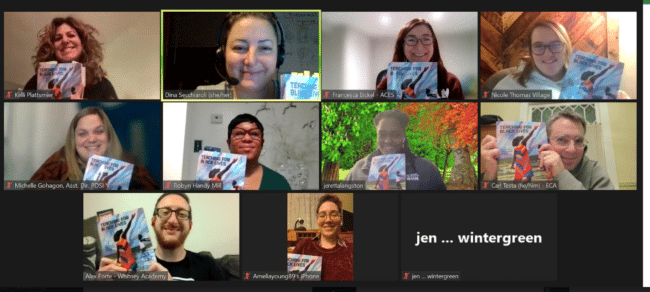
New Haven: One particularly great Teaching for Black Lives chapter and conversation was regarding restorative justice practices and what the specific barriers are in this school year to continuing and/or starting these practices across our schools.
District of Columbia
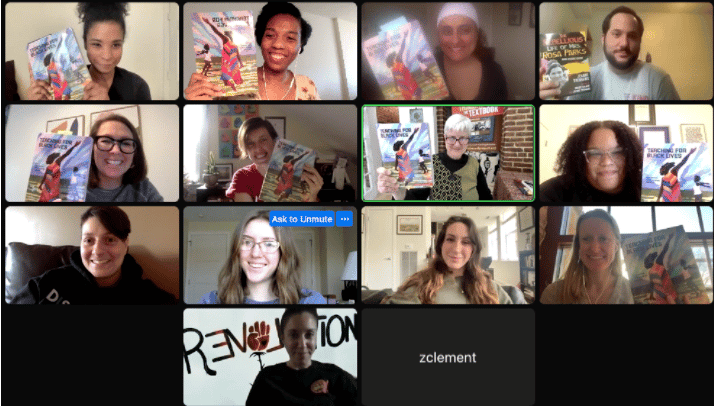 DCAESJ sponsored: The group has met monthly. We read chapters on restorative justice and testing. School is challenging now with the attempt to return to normal and students lacking support and at times acting out to express that pain. We are struggling to maintain true to our restorative and liberatory values amid a retrenchment to punitive justice. We are also trying to see how we can disrupt testing in our contexts. In February the group discussed quotes from the chapters in Teaching for Black Lives on restorative justice (pp. 273-283). In breakout rooms, members shared the quote that resonated with them and their approach to restorative justice and wrestled with questions to guide discussion. In March, they discussed high stakes testing, with quotes from the section on white supremacy, high-stakes testing, and the punishment of Black and Brown students (pp. 243-250).
DCAESJ sponsored: The group has met monthly. We read chapters on restorative justice and testing. School is challenging now with the attempt to return to normal and students lacking support and at times acting out to express that pain. We are struggling to maintain true to our restorative and liberatory values amid a retrenchment to punitive justice. We are also trying to see how we can disrupt testing in our contexts. In February the group discussed quotes from the chapters in Teaching for Black Lives on restorative justice (pp. 273-283). In breakout rooms, members shared the quote that resonated with them and their approach to restorative justice and wrestled with questions to guide discussion. In March, they discussed high stakes testing, with quotes from the section on white supremacy, high-stakes testing, and the punishment of Black and Brown students (pp. 243-250).
School for Girls: The group has inspired us to consider our curriculum overall and how to better apply the values articulated in our school’s equity and pedagogy statements. For example, “To what extent are teachers doing their own internal racial identity work?” and “To what extent do our teachers know how to do their own internal racial identity work?” Social studies classes are also incorporating the Zinn Ed Project lessons more frequently.
Florida
We are enjoying learning topics we haven’t been exposed to before, so many possibilities for including these topics in our curriculum
Georgia
Chamblee: We’ve discussed restorative justice and the steps our school would need to take to get there. We read and discussed the “How K-12 Schools Push Out Black Girls: An interview with Monique W. Morris.” We’ve also spent a lot of time discussing censorship and how our legislature has proposed a variety of bills that would encourage teachers to neglect important topics of the past and present including racism and sexual orientation. Black members of our group have found many parallels between their experiences and those expressed in essays from Teaching for Black Lives like “Reflections of a ‘Deseg Baby” by Linda Mizell and “What do You Mean When You Say Urban” by Dyan Watson.
The greatest challenge we have faced is time scarcity and teacher/administrator burn out. Additionally, we want to bring our discussions to faculty and students. We are seeking time in pre-planning for the next academic year. However, if the Georgia censorship law passes, this is unlikely to be allowed.
Tucker: We are consistently talking about the history know and the history we’re learning in this book. We had a talk about deifying leaders so no one can match up versus accepting people as leaders while understanding their weaknesses.
Iowa
Overall great discussions and great desire for action to happen from the book study members. We will meet one more time in April to close our study and will also meet with our student members of our social justice club to help us make our action plan for next year. Lastly, we are working on a microagression policy where we will educate students instead of punish for microagressions with the hope that empathy and understanding happen, instead of anger over being punished or reprimanded for these actions. (This was at the suggestion of our Black staff members.)
Illinois
Teachers are examining the perspectives they continue to present in their classes and the need to unearth other stories that present a more truthful and inclusive view of our origin story. Teachers have been looking for source materials that they can layer in as well. A major focus, however, was simply on the need for us to read and learn so that we have a more accurate foundation. Our own knowledge impacts what and how we teach.
Kansas
We have moved our conversations online in Canvas and are meeting in person very infrequently. We have just begun discussing sections 1 and 2. Some of the big themes have been Reconstruction as a real historical road map to the democratic future we still want, and strategies to sharpen our racial justice organizing skills by looking at the work of John Muir Elementary.
Maryland
Baltimore: We meet about once a month and have combined with our school’s book club. We are thinking about how to promote ideas of anti-racism to better inform grading policies at school, uniform policies, and approaches to restorative justice and education.
Bel Air: Our group decided to publish a special edition of our union’s newsletter. Two of our study group members are writing editorials, we have several book reviews, exemplar lessons, suggestions for books to read with better representation, and we plan on gathering our members to celebrate Harriet Tubman’s 200th birthday with a field trip to her birthplace and a guided tour of the potential routes she took to freedom (but we’re still working on that last part 
Massachusetts
Bedford: Our work has led to the creation of a DEI statement that the whole district supports. We have been particularly engaged with the whole book and the possibility of using it to develop an ABAR class for the school.
Melrose: We meet once a month virtually for an hour and half with reading and assignments in between. Everything we have read has sparked great discussion. See link to reading schedule.
Salem: We have a superb group of committed humans in our group! We meet on Zoom for an hour each time and in between keep a jamboard for notes, quotes, and resources. We have primarily read and discussed 1-2 pre-assigned articles at the beginning of each session that we all read together and then we branch out and report the other readings we discovered on our own. We recommend titles to each other and then springboard from there to share other resources.
Michigan
We’ve had really great conversations so far. We cover one section each meeting, and have thus covered the first three sections. The group, which includes teachers, administrators from both the building and main administration office, a school psychologist, and a board member, is taking the content very seriously. We are discussing ways to apply what we’re learning to our district and may be developing some curriculum units over the summer.
Minnesota
We have had great conversations using some of the questions in the study guide but have also talked about how some of this fits with elementary students. Book study members have been very thankful for the new learning especially in section 3. We have also had some discussion about tricky topics and the benefits to our learners when teachers are willing to lean into risky topics.
New Mexico
The fourth section of the book, focusing on restorative practices and the school to prison pipeline, definitely fostered our best conversation to date. We discussed certain ideas and misconceptions about restorative practices that the book brought up, and then we shared the restorative practices at our own schools. This got us talking about the larger issue of trying to put together meaningful restorative justice programs school by school as opposed to district-wide.
New Jersey
Maplewood: Each meeting begins with an opportunity for members to check-in. Our group’s conversations are rooted in the Teaching for Black Lives Study Guide Questions. First, we read one section for each meeting. Each person is asked to choose a study guide question that they can focus on in a breakout group. When the numbers permit, we go into breakout groups based on grade level (elementary, middle, high school) for small group discussion.
Somerset: We have focused on Section 5 and articles in Rethinking Schools focused on teachers. This has sparked so much conversation around knowing our students and how important it is to become culturally aware. A deep conversation occurred when the idea of “I don’t see color” came to the forefront.
New York
We have two groups in Brooklyn!
Brooklyn: Some days, participants just hold space for one another. Majority of the time during our meeting is spent discussing our thoughts and connections we make from individual chapters in Teaching for Black Lives.
Brooklyn: We planned a day of action that focused on the idea of renaming and reclaiming Brooklyn. Students learned about the history of slavery in Brooklyn and efforts to raise awareness and rename streets, schools, and public spaces named after slavers. Students wrote to principals of schools named after slavers to ask that they be renamed.
Katonah: We meet every two weeks consistently and we are part of a think tank around equity pedagogy. We read and discuss teaching strategies and ways to normalize equity pedagogy. Additionally, we have focused on iconography in our school district, so, we are discussing ways to involve the school community in creating spaces that reflect our values around inclusion and BIPOC excellence.
White Plains: The article in Teaching for Black Lives by Renee Watson, “Happening Yesterday, Happened Tomorrow: Teaching the ongoing murders of Black men,” sparked rich group conversation. We have really been digging into the content, historical understanding, and self-work that must come together to teach for Black lives.
North Carolina
Durham: We have had such rich discussions around Section Two of the book, particularly Adam Sanchez’s essay. Some of us are only now learning this history, so we’ve processed a lot around our own educations and our need for unlearning. This section in the book inspired us to commit to consciously and explicitly weaving in something WE weren’t taught into our teaching that month. I think we’re all feeling some . . . hope? around the potential for change that normalizing unlearning holds. Therefore, we’re beginning to plan an “unlearning” reflection as a possible action step for our group. Our vision is to end the year inviting students and staff to share something they’ve had to unlearn — or are working on unlearning — or even just know they need to work on unlearning. Here are links to examples of the thinking and writing prompts we’ve used to get the sessions started. (Version one and version two.)
Raleigh: We have taken each section of the book in turn. Two themes emerge: First, the exposure to new histories of schooling, discipline and incarceration, and resistance that were unfamiliar to some faculty members. Second, the surfacing of some justice-oriented goals in our classrooms that may have existed in silos prior to these conversations. Recently, we discussed Section 4 and that brought to the fore important discussions about our experiences working through various systems of discipline, punishment, and classroom management in schools.
Ohio
Columbus We’ve been meeting every other Monday from 6:30-8:30. No unforeseen obstacles. Perhaps we should have scheduled to meet for an additional hour as we always run short on time. Because this group is primarily for preservice teachers who are also student teaching, the conversations tend to center around 1) what they are seeing in the field with regard to their Black students; 2) what they hope for their future classrooms; and 3) how they can use different lessons/pedagogies/resources they’ve read about in the book. Each time that we meet, rich conversations ensue. A section that was particularly engaging for our group (thus far) was Section 3. We are currently witnessing intense gentrification in Columbus, so our group found many connections between the text and the current state of our city. Folks brought in city charters, looked up zip codes, talked about the school districts they’ve been discouraged from applying to, and reflected on their passive use of the word “urban.” Pieces from the book that have really stuck out for our study group include: How One Elementary School Sparked a Citywide Movement to Make Black Students’ Lives Matter; Two Sets of Notes, Presidents and Slaves (lots of Social Studies teachers in this group), What We Don’t Learn About Black Panther Party; What Do You Mean When You Say Urban?, Vacancies to Fill, Shock-Doctrine Schooling in Haiti, Jailing Our Minds, and Teaching the Prison-Industrial Complex. We have not yet met to discuss the last section.
Youngstown: Attendance has been low at both our virtual and more recent in person meetings. Section two led to the liveliest discussion. A few of the people in the study group are also on our school equity team in upper level positions.
Pennsylvania
We have also had conversations about creating better spaces to support our young Black women after reading “Space for Black Women” and how we can push the administration to provide more supports for our LGBTQ+ students including a gender neutral bathroom.
Rhode Island
Providence: We have had themes each time that we meet. Our first meeting was about restorative practices (we read “Restorative Justice: What it is and is not” & “Baby Steps Toward Restorative Justice”). In our second meeting, we focused on whiteness and how white supremacy shows up in our classrooms (we read “Taking the Fight Against White Supremacy Into Our Schools” & “Dear White Teacher”). In our next session, we zoomed out to think about systems and how privilege intersects with our choice to join in on movement work (we read Teaching the Prison Industrial Complex” & “Racial Justice Is Not A Choice”). We will be meeting next week to discuss the ways in which we can integrate racial justice into STEM classrooms and spaces (we will read “Beyond Just a Cells Unit” & “Lead Poisoning”).
Members of our group also helped organize and attended this action to push back against anti-CRT basebuilding happening in our state. We got some not so excellent press following the event, but here is the article for your reference (they did agree to publish our statement after the fact, at least).
Tennessee
Hendersonville: The group has discussed lessons on science (referencing the reading on Henrietta Lacks), DEI, and the anti-CRT attacks.
Nashville: We meet three times a month. The first Saturday, in-person, the first Tuesday and third Saturday, virtually. Creating so many options to meet has been a key part of the consistency and our ability to stay on schedule and read, grow, and plan together. Everyone in the study group is expected to attend at least one of those meetings a month though they are welcome to join as many as they’d like, and many do. We’ve been following the study guide pretty closely. We chopped it up into weeks so that everyone knows the topics we’ll be discussing before they plan to attend. Our conversations have been appropriately difficult, and we hold one another lovingly accountable.
Texas
Recently, we have really been focusing on the limitation of information for students. We’ve experienced pushback on the kinds of curriculum we’ve been able to introduce to students (not all of us.) We’ve met to discuss what it means to take action into our own hands and how we can translate that into agency for our youth.
Virginia
One last item that sparked rich conversation was in our current cultural climate of governors and state legislatures “banning” Critical Race Theory and “divisive” topics (and words) from the classroom, helping teachers to navigate building a portfolio of anti-bias antiracist resources, and rationales for justice education being inextricably entwined with Montessori peace education.
Washington
Pullman: In our study group we had rich conversations around the students’ examples of poetry. This got us talking about the importance of the arts and humanities. We have several folks in our study group affiliated with Washington State University. One of them is a retired Art professor. She reached out to the Jordan Schnitzer Museum of Art and we are now in the process of connecting the university to Pullman School District so students can get the chance to see exhibits like the Black Lives Matter exhibit, the Alison Saar exhibit, and the upcoming Washington state migrant workers exhibit.
We were also inspired to action from the chapter that discussed Confederate monuments and statues. We are organizing to change the name of an elementary school that three Teaching for Black Lives study group members are employed and we are working with the local public library to address a large Jefferson painting they have near their entrance.
Teaching for Black Lives is frequently used as a reference or directly quoted from for the work that we are doing in our local schools and community. It has been an amazing opportunity to have conversations that matter with our colleagues, friends, and neighbors.
Seattle: We have been dividing sessions based up on the “study guide” and interspersing with what is happening in their learning environments. We also want to offer this as an alumni or student group for our second year students.
Sammamish: The piece “What do You Mean When You Say Urban” by Dyan Watson struck a chord because we are in the Pacific Northwest and are a private school in the suburbs of Seattle that has students who travel from places that some might call “urban.” So what does that mean for those students and how they may be viewed?
Wisconsin
LaCrosse: We are meeting every month when possible. The most difficult part is finding a time to meet. Everyone is so burned out that adding additional meetings outside of the school day has been really hard. We have met five times, and plan to meet two more. Every single chapter has provided food for rich discussion. We just completed the section on school to prison pipeline, and one of our teachers who works at the juvenile detention center, said it was an opportunity to think about how we communicate about that program in our district. Teachers are trying different lessons from the book, and we all like the combination of narrative and informative articles. We were able to draw in some conversation on the inclusion of role play in the last Rethinking Schools issue, after discussing the appropriateness of it after Part 3 in the book. We are planning on meeting in May to debrief and what next to think about what our major areas of concern and action are, and figure out how to bring that forward to changemakers in our district.
Hard Times
It has not been easy — and sometimes impossible — to gather outside the regular workday — and during a pandemic.
As one group wrote,
The biggest theme is one of survival. Many of us were out due to COVID and COVID protocols. So, our group recognized that self preservation and self efficacy is something that has to be addressed for the entire school community in order for any actionable plan to be implemented.
Another group wrote that after their district cancelled all “non-essential” meetings due to the sub shortage, it became impossible to meet.
Our message to you? This is long-term work! We will all need to be doing this work next year, and the year after that. Your efforts do matter, even if your study group did not proceed in the way you imagined or hoped. Please continue to let us know how and if we can support you.
Mark Your Calendars: What’s Ahead
Study group members (like those in the Vanguard session below) have enjoyed the curriculum workshops. These are small, interactive sessions that allow you to meet peers from across the country and receive teaching ideas and resources. They are at 4pm PT / 7pm ET for 75 minutes. Professional development certification provided. Sign up today.
April 11: Climate Justice is Racial Justice. Hands on introduction to a classroom lesson. Sign up!
Find the rest of the study group events, including our end-of-year celebration on May 23rd, at the Teaching for Black Lives Study Group Members Resource Page.
Black Lives Matter at School Week of Action and Year of Purpose
We were thrilled to see how many Teaching for Black Lives study group members participated in the annual Black Lives Matter at School Week of Action.
Lamberton Elementary School, Philadelphia, Pennsylvania
In Sheila Myers’ 5th grade class, students read the 13 Guiding Principles in small groups and discussed what the principles meant to them. Then, students selected one principle to illustrate and created a design. Through collaboration with the art teacher, Myers’ students painted their designs on t-shirts and cardboard.
Wyandotte High School, Kansas City, Kansas 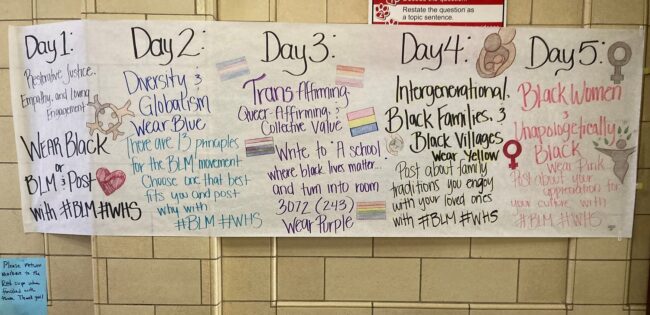
Michael Rebne shared the schools’ week long community calendar of activities for Black Lives Matter at School Week of Action, an activity to center Black women. In having students reflect on their connections — or the lack thereof — to Black women, it drove home how central they are to our shared humanity. Students reflected:
My mother is a very strong woman who has inspired me by her work ethic and her determination.
I admire my 3rd grade teacher, she was a very passionate teacher, and even though I wasn’t a great kid, she still treated me equal to the other kids and wanted everyone to learn.
[I admire my] friend/old neighbor Keyale. Her mom does people’s hair. I would spend nights over there and learn things all the time.
I remember my 3rd grade teacher. . . I always looked up to her because she made me feel safe and comfortable.
I admire my co-worker, Ms. Yvonda, because she is headstrong and just amazing overall.
Community of Peace Academy, St. Paul, Minnesota
Caitie Ryan-Norton read The Undefeated, by Kwame Alexander, in class. Students loved the illustrations and they asked a lot of questions about who was depicted in each picture. They listened to music from artists featured in the book and created a class playlist of the jazz musicians.
Share Your Story
We want to hear your stories! Please tell us about what lesson(s) you used during the Black Lives Matter at School Week of Action. In appreciation for your time, Teaching for Black Lives study group members can receive a free book thanks to generous support from individual donors and publishers. Select your top three choices from this list of books. Share your story here.
All Year Long
A reminder that the 13 guiding principles and national demands of Black Lives Matter at School can be uplifted throughout the year with the Year of Purpose. Beginning in the fall on October 14th with Justice for George Day and reaching into the summer with Juneteenth, the Year of Purpose is designed to intentionally teach for Black lives all year long.

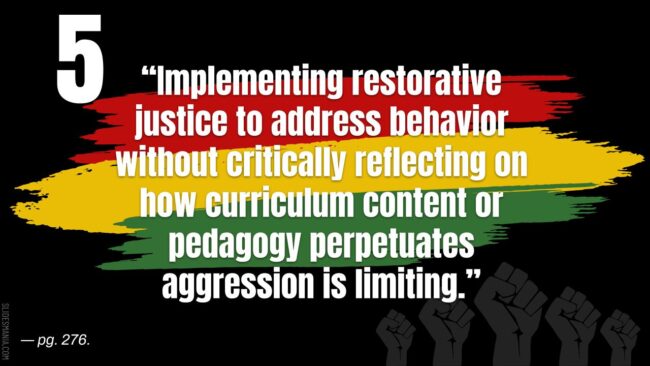
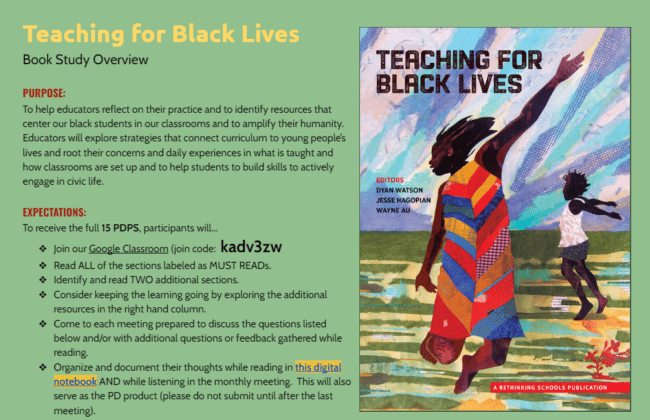
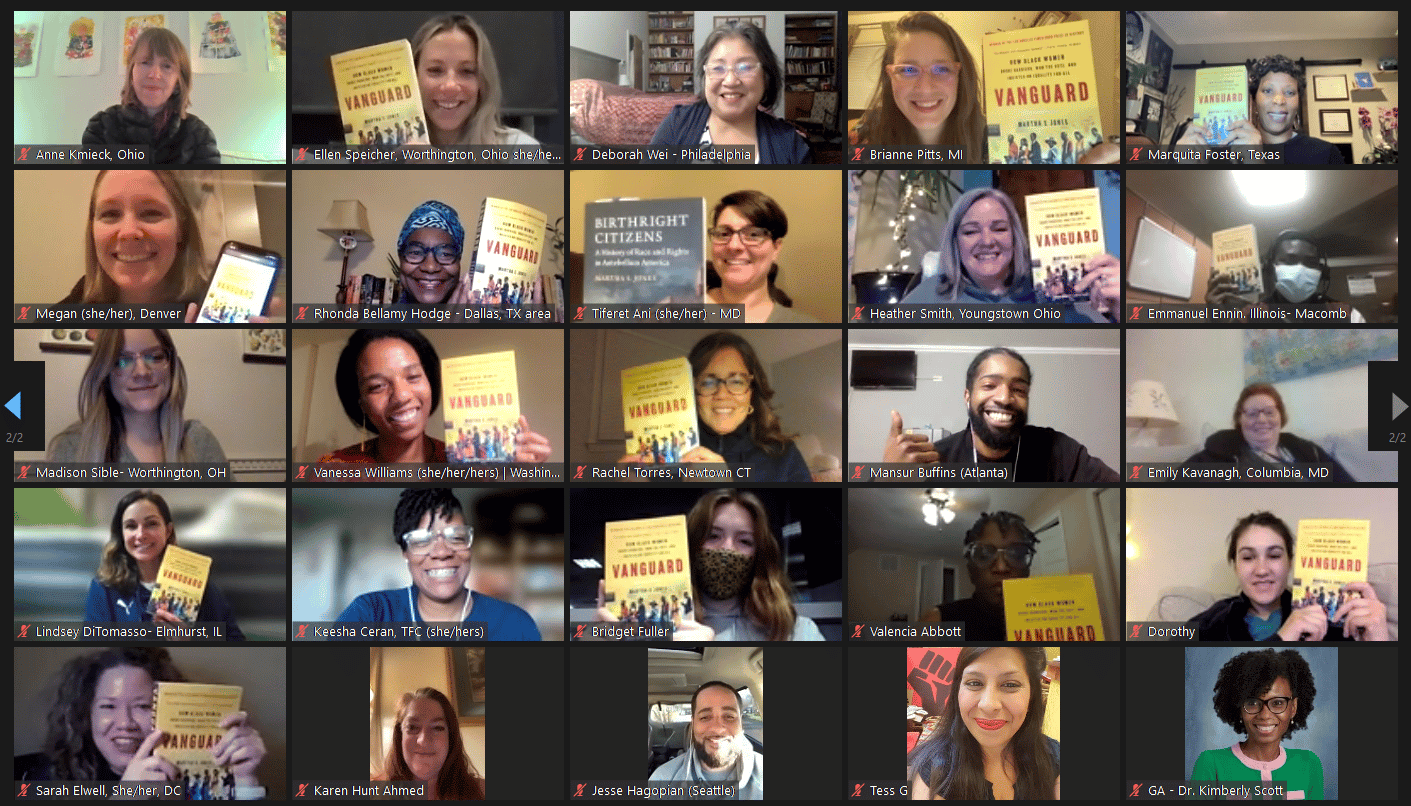





Twitter
Google plus
LinkedIn